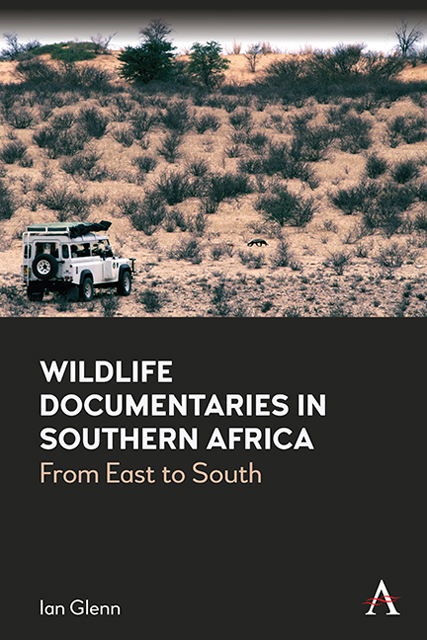Book contents
- Frontmatter
- Dedication
- Contents
- List of Figures
- Acknowledgements
- Introduction
- Chapter 1 What do the Critics Say?
- Chapter 2 A Theoretical Coalition?
- Chapter 3 Gone South: From East to Southern Africa
- Chapter 4 Private Lodges, Infrastructures and Guides
- Chapter 5 Going South: The Results
- Chapter 6 The Early History
- Chapter 7 The South Africans Enter the Game
- Chapter 8 Michael Rosenberg and Partridge Films
- Chapter 9 David and Carol Hughes
- Chapter 10 The Bartletts in the Namib, the Liversedges in Botswana
- Chapter 11 John Varty, Elmon Mhlongo and Londolozi
- Chapter 12 Richard Goss and Kim Wolhuter
- Chapter 13 Dereck and Beverly Joubert
- Chapter 14 Other Major Contributors
- Chapter 15 Going Live: Africam And Wildearth
- Chapter 16 Craig and Damon Foster
- Chapter 17 Must Love Animals?
- Chapter 18 The Social Turn
- Chapter 19 The Future of the Genre
- Chapter 20 The Influence of the Genre
- Conclusion
- Filmography
- Plates
- References
- Index
Chapter 8 - Michael Rosenberg and Partridge Films
Published online by Cambridge University Press: 10 January 2023
- Frontmatter
- Dedication
- Contents
- List of Figures
- Acknowledgements
- Introduction
- Chapter 1 What do the Critics Say?
- Chapter 2 A Theoretical Coalition?
- Chapter 3 Gone South: From East to Southern Africa
- Chapter 4 Private Lodges, Infrastructures and Guides
- Chapter 5 Going South: The Results
- Chapter 6 The Early History
- Chapter 7 The South Africans Enter the Game
- Chapter 8 Michael Rosenberg and Partridge Films
- Chapter 9 David and Carol Hughes
- Chapter 10 The Bartletts in the Namib, the Liversedges in Botswana
- Chapter 11 John Varty, Elmon Mhlongo and Londolozi
- Chapter 12 Richard Goss and Kim Wolhuter
- Chapter 13 Dereck and Beverly Joubert
- Chapter 14 Other Major Contributors
- Chapter 15 Going Live: Africam And Wildearth
- Chapter 16 Craig and Damon Foster
- Chapter 17 Must Love Animals?
- Chapter 18 The Social Turn
- Chapter 19 The Future of the Genre
- Chapter 20 The Influence of the Genre
- Conclusion
- Filmography
- Plates
- References
- Index
Summary
‘My film school was at Partridge, really.’
–Dereck JoubertIntroduction
Many people told me I should interview Michael Rosenberg if I wanted to understand wildlife documentary in Southern Africa. He had, I was told, won more Golden Pandas than any other producer and numerous awards elsewhere. He had discovered one great new filmmaker after another. While he was clearly a global figure in wildlife documentary, he seemed to have had a disproportionate influence on developments in Southern Africa. I found out he had returned to South Africa from England and was living in Durban. While in Durban for the Durban Wild Talk Africa conference in July 2013, I went to where he was staying to meet and interview him.
We had a lengthy and cheerful lunch where he was eager to share his insights and background. Early on, he said pithily, about his career and what his company, Partridge, had achieved, ‘They say you can’t fart against thunder, but we showed you could!’ He gave me copies of lists of his films and awards and, when I eyed his cases of DVDs produced by Partridge avidly, said that we should meet again and see what I needed, pointing out that he didn’t have the rights to share the films as he no longer owned Partridge.
I tried a few times after our meeting to see him again but he responded once or twice by saying he was in ill-health. I was busy with other projects and my last year of departmental headship and didn’t pursue it strongly enough. He died in November 2015 before I could interview him again.
Biography
In 2002, Michael Bright interviewed Rosenberg for WildFilmHistory and this is the single best introduction to his life and vision. He had a privileged introduction to wildlife in that his father, a businessman who owned a steel production company, had bought land next to the Kruger Park where they spent time every year, with his father filming but being frustrated by the results. As Rosenberg put it: ‘He had no idea what he was going to get, he had no idea why he wanted it, and I have his films today which prove that he had no idea how to put them together’ (Rosenberg 2002).
- Type
- Chapter
- Information
- Wildlife Documentaries in Southern AfricaFrom East to South, pp. 117 - 122Publisher: Anthem PressPrint publication year: 2022

